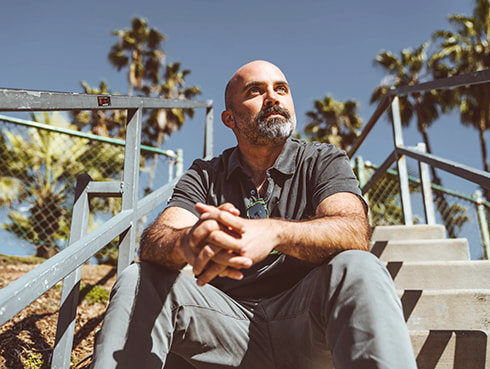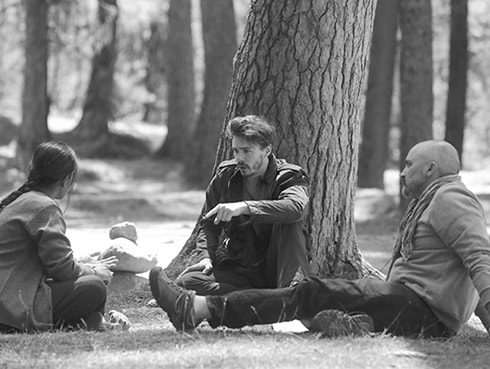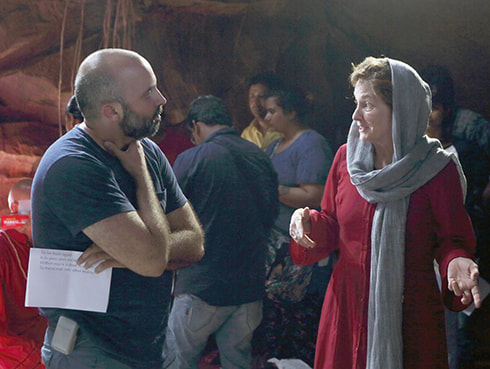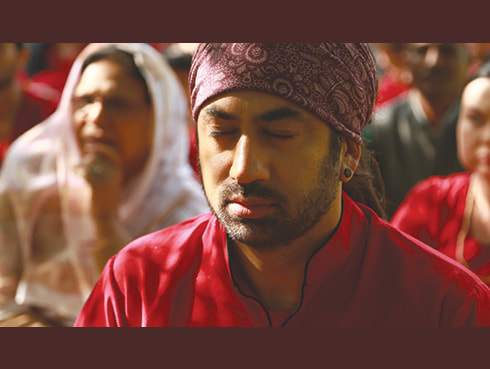
Ben Rekhi is the director of the film THE ASHRAM that will be screened at the Indian Film Festival of Los Angeles, Sunday, April 15, 2018 at 3:30 pm.
In an exclusive interview,he talks about his film, spirituality and shooting in India.
The Indian Film Festival of Los Angeles (IFFLA) runs April 11-15 at Regal L.A. LIVE, Downtown Los Angeles.
In an exclusive interview,he talks about his film, spirituality and shooting in India.
The Indian Film Festival of Los Angeles (IFFLA) runs April 11-15 at Regal L.A. LIVE, Downtown Los Angeles.
Questions:
1. How did you come upon this story and what about it interested you?
I was traveling in Rishikesh about 15 years ago and was fascinated by the clash of cultures there, the idea that westerners would come to India seeking enlightenment. But as I spent more time, I was struck by stories of people going missing on their spiritual quests, and the idea for the story was born. It’s really about an atheist searching for his missing girlfriend who ends up finding himself. As someone who is of mixed Indian descent, I have always been fascinated by stories that are at the intersection of two cultures, and this is one I had not seen before.
2. Why did you decide to make it in the thriller genre?
Thrillers are a great way to mask some deeper themes, as they keep the tension high while exploring deeply personal issues. Ultimately a film should be entertaining; thrillers offer a way to keep audiences guessing and on the edge of their seat while also telling an emotional story.
3. Are you spiritually inclined?
I’ve always believed in a higher power, whether it’s a God or some kind of universal energy, but I haven’t always been willing to suspend my logic for the sake of religion. But in my own journey, I’ve gone from being a skeptic to being much more open to the idea of things beyond our comprehension. In many ways, the film chronicles that journey - following a skeptical character who learns to believe in something greater than himself.
4. The film raises many philosophical questions. Can you talk about some of them that matter to you.
One philosophical question the film raises is the idea of destiny vs chaos in the universe. Are there signs around us that point to a higher power? Or is it all just random? Is it our perception of events that give meaning to them, or do they inherently have meaning whether we see them or not? I think the truth is somewhere in between.
It takes themes from Hinduism and Buddhism about reincarnation and says, what if they are true? What is the soul, and where does it go after we die? These are age-old questions that we wanted to explore in a contemporary way… so that whether you believe in them or not, the hope is that the exploration of the themes is entertaining in and of itself.
And finally, in the journey of life, the search for answers often raises more questions. Ultimately, faith comes from accepting what we don’t know or can’t prove. These are big concepts that have fascinated me for years that I wanted to explore in the film.
5. Your story touches deeply on the topic of love and soulmates. Do you believe in soulmates?
As a romantic, I want to believe in the concept of soulmates. Maybe they exist, but the question then becomes why do some people find them and others do not? I don’t know the answer. The film really explores the idea that in order to find our soulmate, we have to find ourselves first. I think this is true with love in general.
6. You have a great cast. Were they your first choices?
We were fortunate to have an incredibly talented cast. Melissa Leo came to us through our producer Guneet Monga, as they knew each other previously from serving on a festival jury together. She was the first cast member to join the team. Guneet also knew Kal Penn and Radhika Apte, as they’d been looking for something to work on together for awhile. We found Sam Keeley and Hera Hilmar through auditions, who both blew us away in their reads. Incidentally, they are a real life couple, which only helped in their on-screen chemistry.
7. What was it like shooting in India? Do talk about the specific location where the film is shot.
Shooting in India is an adventure! There’s a certain amount of chaos that you can’t control, but with the right mindset it’s exhilarating. We were extremely ambitious in our locations. We shot in underground locations full of bats, on the edge of 1000 foot cliffs, we had to river raft to locations, trek to locations, with a crew of almost 100 people. The main location was Manali in the north of india, at an elevation of 10,000 feet. Life is extreme in the mountains, we got caught in hail and thunderstorms, the river was raging, the light was changing. But in the end, it’s a wild and spiritual place, and the film captures that. It’s incredibly cinematic.
8. What’s your favorite thing about being a filmmaker?
To be, being a filmmaker is about telling stories that can help you see the world differently. It’s an inspiring feeling to have an idea, bring a group of people together to execute it, then show it to audiences around the world. While I like a lot of aspects of filmmaking, my favorite is being on set, creating in the moment with a talented team of people. It forces you to be present, solve problems together, and trust to your instincts. Nothing makes me feel more alive than being on set.
9. Tell us about your next film/project?
I’m in post production on a film set against the drug wars in the Philippines called MARIA. It follows the story of a mother who, after the murder of her husband, must navigate the dark underworld of Manila to protect her children. It’s very different than the ASHRAM, but another adventure across the world that I hope will shed light on an important and tragic issue.
I’m also in production on a documentary series for PBS called THE HIDDEN VOTE, which follows minorities who crossed party lines and voted in surprising ways in the last election.
10. Who are some of your favorite filmmakers?
Anyone who has made a distinct mark in the world of cinema. Kubrick, Hitchcock, the Coen Brothers, Wes Anderson, they’ve all built bodies of work that have a unique vision and style that is instantly recognizable within a single frame or scene. Amongst newer filmmakers I think Cary Fukunaga, Alfonso Cuaron and Denis Villeneuve are doing extraordinary work across different genres.
11. What advice would you give to a young aspiring filmmaker?
Just go for it. Filmmaking is one of the most competitive fields out there, but it’s more possible now than ever to make your movie. The tools are there to make it for very little money. The hard part is getting it seen. Especially in a landscape where there’s infinite content to compete with. But you won’t hone your skills unless you just go out and do it.
The hard part is figuring out your voice as a filmmaker. What’s your point of view? What are you trying to say? Why should audiences care? Aligning your craft with your vision takes time, and the only way to do it is with experience. So stop thinking and just do it!
1. How did you come upon this story and what about it interested you?
I was traveling in Rishikesh about 15 years ago and was fascinated by the clash of cultures there, the idea that westerners would come to India seeking enlightenment. But as I spent more time, I was struck by stories of people going missing on their spiritual quests, and the idea for the story was born. It’s really about an atheist searching for his missing girlfriend who ends up finding himself. As someone who is of mixed Indian descent, I have always been fascinated by stories that are at the intersection of two cultures, and this is one I had not seen before.
2. Why did you decide to make it in the thriller genre?
Thrillers are a great way to mask some deeper themes, as they keep the tension high while exploring deeply personal issues. Ultimately a film should be entertaining; thrillers offer a way to keep audiences guessing and on the edge of their seat while also telling an emotional story.
3. Are you spiritually inclined?
I’ve always believed in a higher power, whether it’s a God or some kind of universal energy, but I haven’t always been willing to suspend my logic for the sake of religion. But in my own journey, I’ve gone from being a skeptic to being much more open to the idea of things beyond our comprehension. In many ways, the film chronicles that journey - following a skeptical character who learns to believe in something greater than himself.
4. The film raises many philosophical questions. Can you talk about some of them that matter to you.
One philosophical question the film raises is the idea of destiny vs chaos in the universe. Are there signs around us that point to a higher power? Or is it all just random? Is it our perception of events that give meaning to them, or do they inherently have meaning whether we see them or not? I think the truth is somewhere in between.
It takes themes from Hinduism and Buddhism about reincarnation and says, what if they are true? What is the soul, and where does it go after we die? These are age-old questions that we wanted to explore in a contemporary way… so that whether you believe in them or not, the hope is that the exploration of the themes is entertaining in and of itself.
And finally, in the journey of life, the search for answers often raises more questions. Ultimately, faith comes from accepting what we don’t know or can’t prove. These are big concepts that have fascinated me for years that I wanted to explore in the film.
5. Your story touches deeply on the topic of love and soulmates. Do you believe in soulmates?
As a romantic, I want to believe in the concept of soulmates. Maybe they exist, but the question then becomes why do some people find them and others do not? I don’t know the answer. The film really explores the idea that in order to find our soulmate, we have to find ourselves first. I think this is true with love in general.
6. You have a great cast. Were they your first choices?
We were fortunate to have an incredibly talented cast. Melissa Leo came to us through our producer Guneet Monga, as they knew each other previously from serving on a festival jury together. She was the first cast member to join the team. Guneet also knew Kal Penn and Radhika Apte, as they’d been looking for something to work on together for awhile. We found Sam Keeley and Hera Hilmar through auditions, who both blew us away in their reads. Incidentally, they are a real life couple, which only helped in their on-screen chemistry.
7. What was it like shooting in India? Do talk about the specific location where the film is shot.
Shooting in India is an adventure! There’s a certain amount of chaos that you can’t control, but with the right mindset it’s exhilarating. We were extremely ambitious in our locations. We shot in underground locations full of bats, on the edge of 1000 foot cliffs, we had to river raft to locations, trek to locations, with a crew of almost 100 people. The main location was Manali in the north of india, at an elevation of 10,000 feet. Life is extreme in the mountains, we got caught in hail and thunderstorms, the river was raging, the light was changing. But in the end, it’s a wild and spiritual place, and the film captures that. It’s incredibly cinematic.
8. What’s your favorite thing about being a filmmaker?
To be, being a filmmaker is about telling stories that can help you see the world differently. It’s an inspiring feeling to have an idea, bring a group of people together to execute it, then show it to audiences around the world. While I like a lot of aspects of filmmaking, my favorite is being on set, creating in the moment with a talented team of people. It forces you to be present, solve problems together, and trust to your instincts. Nothing makes me feel more alive than being on set.
9. Tell us about your next film/project?
I’m in post production on a film set against the drug wars in the Philippines called MARIA. It follows the story of a mother who, after the murder of her husband, must navigate the dark underworld of Manila to protect her children. It’s very different than the ASHRAM, but another adventure across the world that I hope will shed light on an important and tragic issue.
I’m also in production on a documentary series for PBS called THE HIDDEN VOTE, which follows minorities who crossed party lines and voted in surprising ways in the last election.
10. Who are some of your favorite filmmakers?
Anyone who has made a distinct mark in the world of cinema. Kubrick, Hitchcock, the Coen Brothers, Wes Anderson, they’ve all built bodies of work that have a unique vision and style that is instantly recognizable within a single frame or scene. Amongst newer filmmakers I think Cary Fukunaga, Alfonso Cuaron and Denis Villeneuve are doing extraordinary work across different genres.
11. What advice would you give to a young aspiring filmmaker?
Just go for it. Filmmaking is one of the most competitive fields out there, but it’s more possible now than ever to make your movie. The tools are there to make it for very little money. The hard part is getting it seen. Especially in a landscape where there’s infinite content to compete with. But you won’t hone your skills unless you just go out and do it.
The hard part is figuring out your voice as a filmmaker. What’s your point of view? What are you trying to say? Why should audiences care? Aligning your craft with your vision takes time, and the only way to do it is with experience. So stop thinking and just do it!





 RSS Feed
RSS Feed
